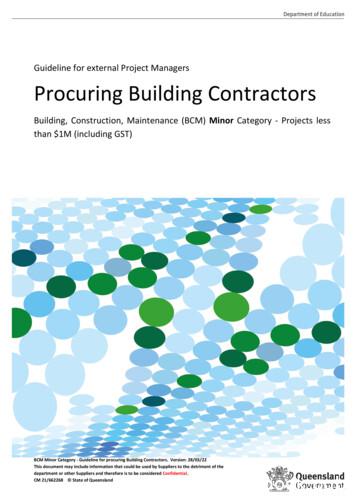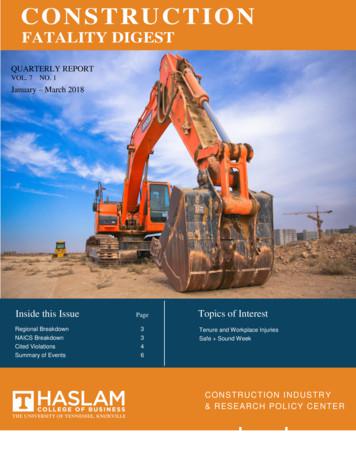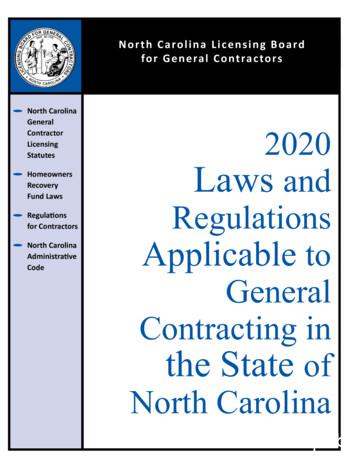Regulation Of Construction Contractors
Department of Commerce, Community,and Economic DevelopmentDIVISION OF CORPORATIONS, BUSINESS ANDPROFESSIONAL LICENSINGGOVERNOR BILL WALKERP.O. Box 110806Juneau, Alaska 99811-0806Main: 907.465.2550Fax: 907.465.2974Regulation of Construction ContractorsFrequently Asked Questions (FAQs)INFORMATION FOR CONSUMERS:WHAT SHOULD I KNOW BEFORE HIRING A CONSTRUCTION CONTRACTOR?Most home construction contractors provide skilled services, hire trained and licensedsubcontractors, and use reliable materials. But not every person who purports to be acontractor is skilled, experienced, and qualified. Before embarking on your homeimprovement project, take the following steps:Make sure the contractor is registered and has a bond and insurance. In Alaska, mostcontractors that perform residential home improvements must be licensed by theDivision of Corporations, Business and Professional Licensing. Among otherrequirements, general contractors must post a bond for 25,000 and specialtycontractors for 10,000.Warning: Sometimes people will say they are "licensed and insured" when theyonly have a business license and liability insurance -- not a professional licenseand a bond. A bond may be a source of funds available to a homeowner if workis negligently performed.Check references and get written estimates. Being licensed and bonded is not aguarantee of high quality performance. Interview and get bids from two or threecontractors. Check their references and talk to friends, neighbors, or former clients whoare familiar with the contractor's work, reliability, and business practices. Estimatesshould be in writing and include detailed specifications for the job, the materials, labor,timeline, and the total charges for the work.Research complaint history. Check with the BBB for complaints against the contractor.You may also want to check court records to see if lawsuits have been filed forincomplete or shoddy workmanship or for other unfair or deceptive practices.
CBPL Contractor Licensing FAQPage 2Insist on a detailed written contract. A home improvement contract is a writtenagreement defining exactly what work will be performed, the materials used, the startand completion dates, the total cost of the project, and a payment schedule. Oralpromises are very difficult to enforce; if a provision is not written in the contract, you'llhave a hard time proving it was part of the deal. A well-written, detailed contract willprovide clear expectations for you and the contractor and help avoid many of theproblems experienced by consumers. Ask for time to review the contract on your ownand make sure you understand the contract terms. Don't hesitate to ask for clarificationor suggest modifications. Never sign a contract with blank spaces.Tip: Alaska has a five-day cancellation period (five business days) when a sellersolicits a sale and the agreement is signed in your home or at a place other thanthe contractor's place of business. The contractor should provide written noticeof this right.Make partial payments as different stages are completed. Don't pay a contractor in fullbefore your project is completed. Most projects are paid for in installments, with partialpayments made at different stages. Final payment should be contingent on satisfactoryinspection of the project.You should know the entire cost of your proposed project, including any interestcharges, and then comparison shop for the financing you need from reputable lendersthrough personal, bank, or home equity loans.HOW DO I KNOW IF A CONSTRUCTION CONTRACTOR IS LICENSED AND INSURED?You can check to see if a contractor is licensed in the State of Alaska by doing a ProfessionalLicense Search on the Division of Corporations, Business Licensing and ProfessionalLicensing section’s website. In the Professional License Search details, you can see if theconstruction contractor’s license is current, what specialty type of license they may haveand if there has ever been any licensing action taken against them.WHAT IF WHO I AM HIRING IS A “HANDYMAN”?Starting January 1, 2015, a professional “General Contractor – Handyman” license isrequired. If someone is doing business under this license, the aggregate total of the projectmust not exceed 10,000 and they must carry public liability and property damageinsurance as required by AS 08.18.101.HOW CAN I PROTECT MYSELF FROM HOME IMPROVEMENT SCAMS?Don't do business with anyone who claims to be a contractor and who: solicits door-to-door
CBPL Contractor Licensing FAQPage 3 asks you to pay for the entire job up-front pressures you for an immediate decision offers you discounts for finding other customers just happens to have materials left over from a previous job only accepts cash payments asks you to get the required building permits offers exceptionally long guarantees suggests that you borrow money from a lender the contractor knows. Ifyou're not careful, you could lose your home through a home improvementloan scam.WHAT STEPS CAN I FOLLOW TO ENSURE MY HOME IMPROVEMENT PROJECT IS DONECORRECTLY? Ensure that your contractor has complied with state licensing requirements. Verify your contractor's name, address, telephone number, credentials, andreferences before signing a home improvement contract. Solicit two or three bids from contractors for your project, and get writtenestimates for the detailed specifications included in your home improvementplan. Include in your contract all the terms, conditions, warranties, and verbalpromises concerning your home improvement project. Do not sign a contract until you have thoroughly read and understood all itsprovisions, notices, and terms. Never sign a written agreement that is notcompletely filled out. Obtain and keep copies of every written document, including contracts andreceipts from suppliers and others providing materials for your project. Take your time, and do not hesitate to say no to high pressure sales tactics bya contractor or sales representative. Know about your five-day cancellation rights for door-to-door sales, anddon't hesitate to cancel a home improvement contract within the timeperiod if you have concerns. Never pay for the entire job in advance or make scheduled payments beforethe agreed-upon terms are met and the work is completed to your fullsatisfaction.
CBPL Contractor Licensing FAQPage 4INFORMATION FOR CONTRACTORSDO I NEED A CONSTRUCTION CONTRACTOR LICENSE?The only way to evaluate whether you need a license is to become familiar with the lawsgoverning your profession. The statutes and regulations regarding contractors cover allcircumstances in which you need a contractor license and provides for certain exemptions.You may need a Construction Contractor or Mechanical/Electrical Administrator license if: Your business name, signage, or advertising potentially indicates to thepublic that you are either are a builder or contractor, or that you arequalified to engage in the contracting business. If you plan to submit bids to work as a contractor. If you work for a contractor, work as a subcontractor on smaller jobs for ageneral contractor, or subcontract work to a licensed contractor. If you perform mechanical or electrical installation. If you perform mechanical or electrical repairs or maintenance. TheDepartment of Labor (Anchorage: 269-4925, Juneau: 465-4871, Fairbanks:451-2894) may also require that certain electrical and mechanical work beperformed by a licensed journeyman.I’M A HANDYMAN. DO I NEED A PROFESSIONAL LICENSE?In a move designed to provide consumer protection to Alaskans, the legislature passed SB193 extending the licensure and bonding requirement to all construction contractors—including those often known as “handymen” who work on smaller jobs.While many handymen don’t consider themselves construction contractors, Alaska Statutedefines a construction as constructing, altering, repairing, moving, or demolishing abuilding, highway, road, railroad, or any type of fixed structure, including excavation andsite development and erection of scaffolding. (AS 08.18.171(4))Regardless of the size of the job, any business or person that “a person who, in the pursuitof an independent business, undertakes or offers to perform, or claims to have the capacityto perform, or submits a bid for a project” to perform this type of work is considered aconstruction contractor and must be registered, bonded, and insured. (AS 08.18.171(4))Starting January 1, 2015, a professional “General Contractor – Handyman” license for thistype of work is required. If you are doing business under this license, the aggregate total ofthe project must not exceed 10,000 and you must carry public liability and propertydamage insurance as required by AS 08.18.101.
CBPL Contractor Licensing FAQPage 5WHAT ARE THE AMOUNTS OF BONDING REQUIRED OF CONTRACTORS?Effective January 1, 2015, bonding requirements for existing contractor and home inspectorlicense types have increased: General contractor: 25,000 General contractor with residential contractor endorsement who performsexclusively residential work: 20,000 Mechanical or specialty contractor: 10,000 Home inspector: 10,000 Handyman (Contractor whose work on one project with an aggregate contract priceof 10,000 or less, including all labor, materials, and other items, when the work isnot part of a larger or major operation or otherwise divided into contracts of lessthan 10,000 to evade a higher bonding requirement): 5,000HOW DO I OBTAIN A CONSTRUCTION CONTRACTOR LICENSE?To apply for any type of contractor license—or if you have further questions— contact alicensing examiner and visit the web ntractorsThe licensing examiners are at our main office in Juneau and may be contacted viatelephone or email:Karl Marx (A-F) 465-5470Andy Khmelev (G-M) 465-8444Janet Brown (N-Z) 465-5372
contractors that perform residential home improvements must be licensed by the Division of Corporations, Business and Professional Licensing. Among other requirements, general contractors must post a bond for 25,000 and specialty contractors for 10,000. Warning: Sometimes people will say they are "licensed and insured" when they
238160 Roofing Contractors . 238170 Siding Contractors . 238190 Other Foundation, Structure, and Building Exterior Contractors . 238210 Electrical Contractors and Other Wiring Installation Contractors . 238220 Plumbing, Heating, and Air-Conditioning Contractors . 238290 Other Building Equipment Contractors . 238310 Drywall and Insulation .
contractors, with a minimum of three (3) " local" contractors invited with the Regional Infrastructure Advisor / manager involved in the process of determination. For values between 500,000 and 1,000,000 the works are to be offered to a minimum of five (5) "local" contractors, with a minimum of three (3) " local" contractors.
Contractors and suppliers need to engage with both Thames Water and each other to ensure we are able to achieve these aims. 1.3 Objectives Contractors should develop their own objectives which support the delivery of our aims. Thames Water will work collaboratively with contractors to achieve them. Contractors must monitor the delivery
Non-Registered Contractors and Accreditation for Skilled Construction Workers and Construction Site Supervisors S/NO TYPE OF APPLICATION KENYAN CONTRACTORS (KShs.) FOREIGN CONTRACTORS (US ) A 1. New application 5,000.000 500 2. Up-grading class of Con
238120 Structural Steel and Precast Concrete Contractors 2 2.3% 238390 Other Building Finishing Contractors 2 2.3% 236116 New Multifamily Housing Construction 1 1.1% 236210 Industrial Building Construction 1 1.1% 237110 Water and Sewer Line and Related Structures Construction 1 1.1% 238170 Siding Contractors 1 1.1%
236115 New Single-Family Housing Construction 5 3.4% 238120 Structural Steel and Precast Concrete Contractors 5 3.4% 238140 Masonry Contractors 5 3.4% 237110 Water and Sewer Line and Related Structures Construction 4 2.7% 237130 Power and Communication Line and Related Structures Construction 4 2.7% 238310 Drywall and Insulation Contractors 4 2.7%
Contractors prescribe certain standards for persons, firms and corporations who enter into contracts for construction work in this state. The practice act providing specific regulatory authority over general contractors is found under N.C. General Statute §87, Article 1. Current laws in North Carolina define general contractors as
Grade 2 Mathematics Student At-Home Activity Packet This At-Home Activity Packet includes 22 sets of practice problems that align to important math concepts your student has worked with so far this year. We recommend that your student completes one page of practice problems each day. Encourage your student to do the best they can with this content—the most important thing is that they .























